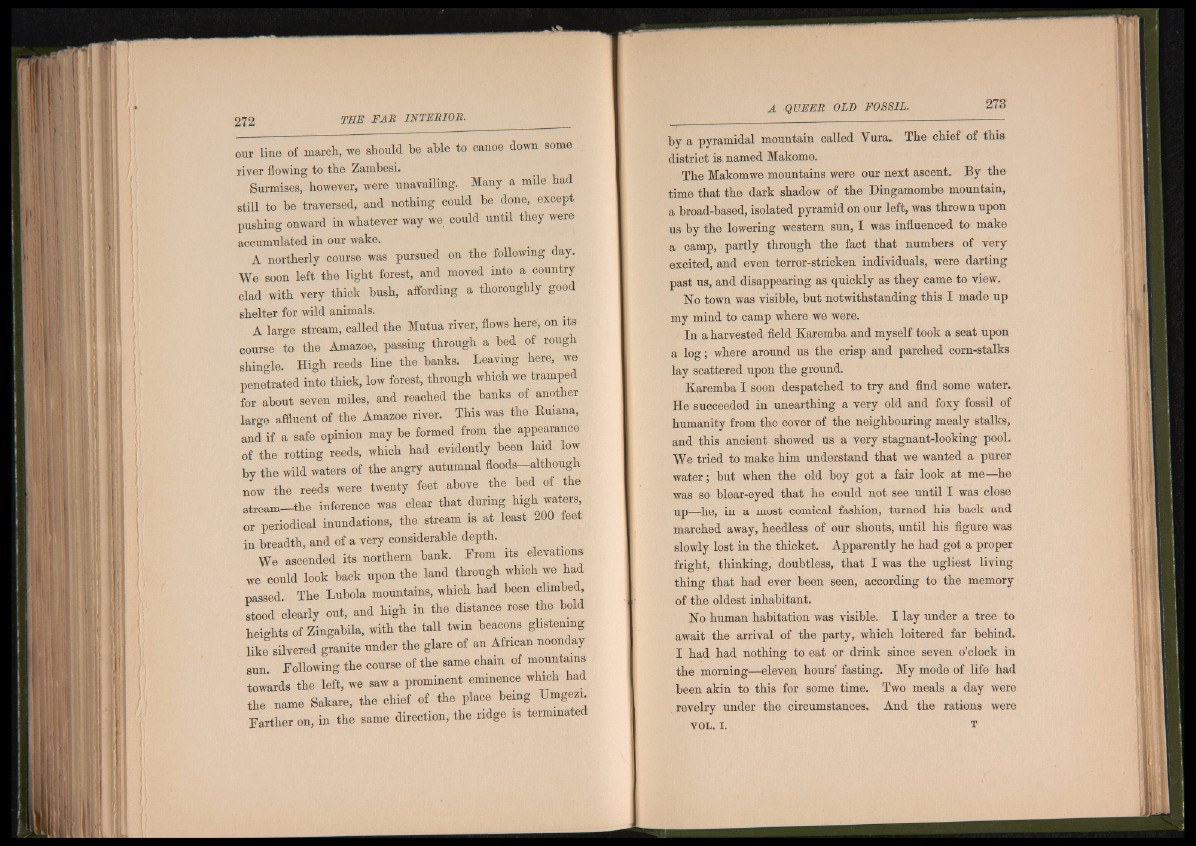
our line of march, we should be able to canoe down some
river flowing to the Zambesi.
Surmises, however, were unavailing. Many a mile had
still to be traversed, and nothing could be done, except
pushing onward in whatever way we could until they were
accumulated in our wake.
A northerly course was pursued on the following day.
We soon left the light forest, and moved into a country
clad with very thick bush, affording a thoroughly good
shelter for wild animals.
A large stream, called the Mutua river, flows here, on its
course to the Amazoe, passing through a bed of rough
shingle. High reeds line the banks. Leaving here, we
penetrated into thick, low forest, through which we tramped
for about seven miles, and reached the banks of another
large affluent of the Amazoe river. This was the Ruiana,
and if a safe opinion may be formed from the appearance
of the rotting reeds, which had evidently been laid low
by the wild waters of the angry autumnal floods—although
now the reeds were twenty feet above the bed of the
stream-the inference was clear that during high waters,
or periodical inundations, the stream is at least 200 feet
in breadth, and of a very considerable depth.
We ascended its northern bank. From its elevations
we could look back upon the land through which we had
passed The Lubola mountains, which had been climbed,
stood clearly out, and high in the distance rose the bold
heights of Zingabila, with the tall twin beacons glistening
like silvered granite under the glare of an African noonday
sun. Following the course of the same chain of mountains
towards the left, we saw a prominent eminence which ha
the name Sakare, the chief of the place being TTmgezi
Farther on, in the same direction, the ridge is terminated
by a pyramidal mountain called Yura. The chief of this
district is named Makomo.
The Makomwe mountains were our next ascent. By the
time that the dark shadow of the Dingamombe mountain,
a broad-based, isolated pyramid on our left, was thrown upon
us by the lowering western sun, I was influenced to make
a camp, partly through the fact that numbers of very
excited, and even terror-stricken individuals, were darting
past us, and disappearing as quickly as they came to view.
No town was visible, but notwithstanding this I made up
my mind to camp where we were.
In a harvested field Karemba and myself took a seat upon
a log; where around us the crisp and parched corn-stalks
lay scattered upon the ground.
Karemba I soon despatched to try and find some water.
He succeeded in unearthing a very old and foxy fossil of
humanity from the cover of the neighbouring mealy stalks,
and this ancient showed us a very stagnant-looking pool.
We tried to make him understand that we wanted a purer
water; but when the old boy got a fair look at me—he
was so blear-eyed that he could not see until I was close
up—he, in a most comical fashion, turned his back and
marched away, heedless of our shouts, until his figure was
slowly lost in the thicket. Apparently he had got a proper
fright, thinking, doubtless, that I was the ugliest living
thing that had ever been seen, according to the memory
of the oldest inhabitant.
No human habitation was visible. I lay under a tree to
await the arrival of the party, which loitered far behind.
I had had nothing to eat or drink since seven o’clock in
the morning—eleven hours’ fasting. My mode of life had
been akin to this for some time. Two meals a day were
revelry under the circumstances. And the rations were
VOL. I. t